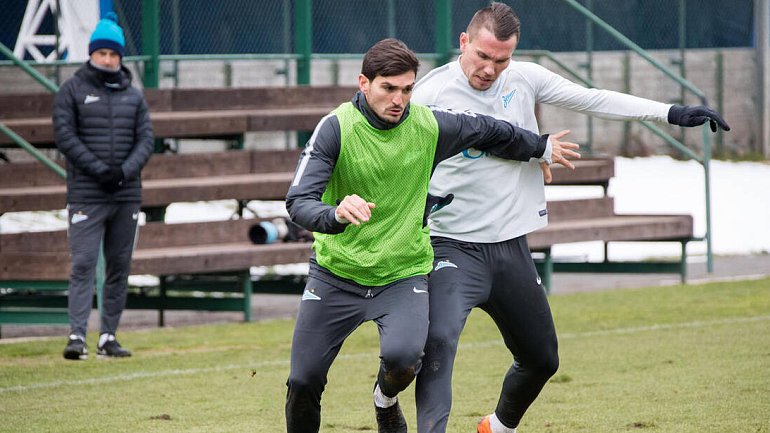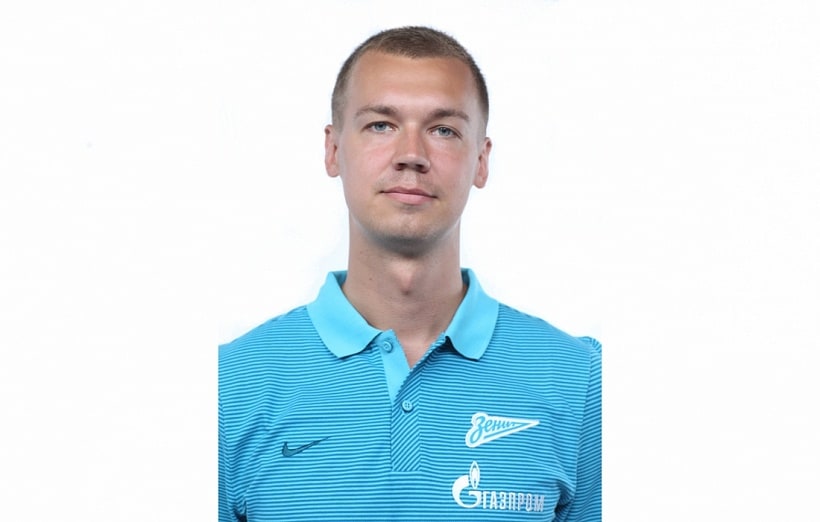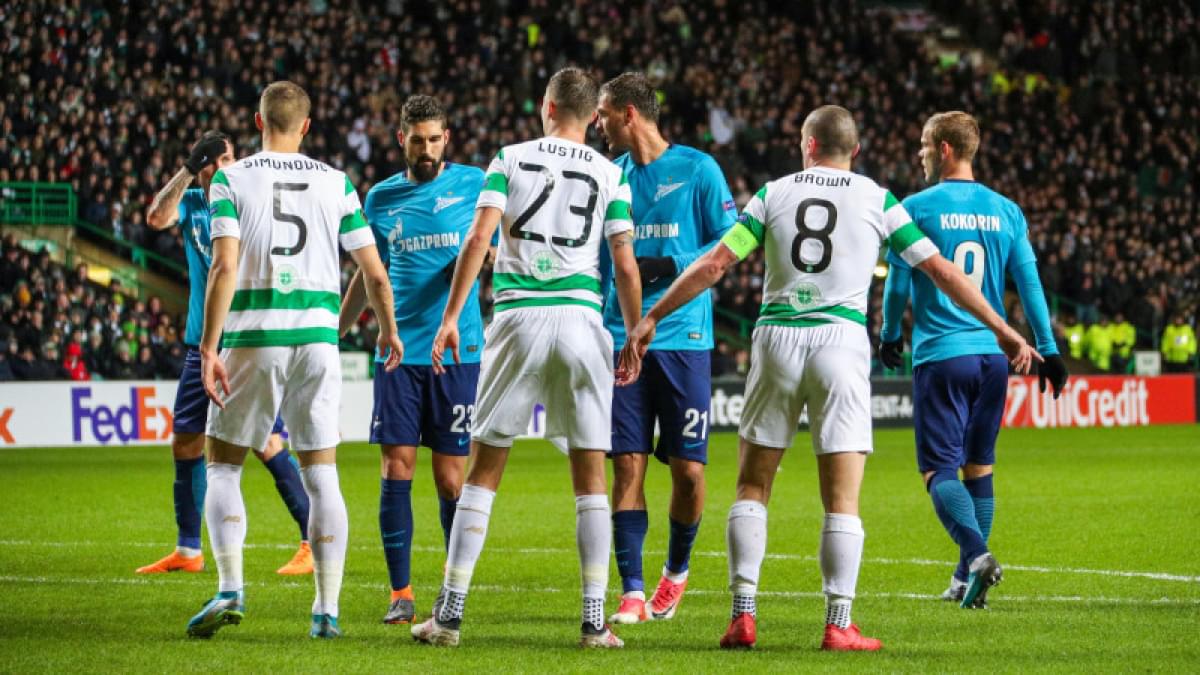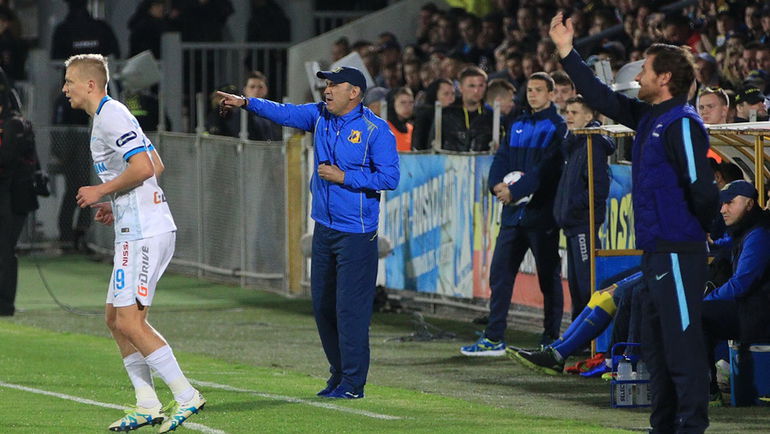-
FC Zenit coach Iikka Miettinen: I knew that I would not return to Finland. And now I know how to communicate with the Russians
The story of the Finn who stayed in Russia for seven years to help Zabolotny and Ozdoev in analyzing the technical and tactical actions14.08.18 21:12

Nobody noticed this, but not so long ago a real Finnish legionnaire has appeared in FC Zenit Saint Petersburg. Iikka Miettinen abandoned his football career and his native country for the sake of education in Russia. It does not seem that now he regrets about that, since reasoning of an intelligent young man is just as verified as his video cutouts. After forty minutes of conversation, I had to believe that I was facing a future coach. The one who knows several languages. And he speaks Russian so well that some of our students could envy. Those who knows Iikka a little are not surprised that he deserved the place of coach in the club academy.
It is amazing when they say that Finland is boring
— Iikka, the incredible thing is not just about your willingness to communicate in Russian. I heard it myself when FC Zenit photographer Vyacheslav Evdokimov told you in response to something by citation from one Soviet time song: "We are peaceful people, and our armored train is on the sidetrack." And this phraseological storm happens all the time. Is it easy to get his verbal escapades?
— Of course, there can be new words that I have to ask again (smiling). But this guy has many interesting stories. He has been to many places, he has seen a lot. It is interesting to listen to him.— What is the main stereotype about the Finns?
— It's amazing when they say that it's boring in Finland. People usually just do not know what to look at and where to go. If one knows, it is not boring.— And where should one go?
— Anywhere. Depending on what you are interested in. In summer, there are different events, concerts, music and gastronomic festivals in almost every town. A lot to see! It is just necessary to explore the opportunities.— And what nonsense is popular in Finland about Russians?
— The one that all the Russians drink. This is completely wrong. The young generation, for example, does not drink much alcohol. Healthy lifestyle is much more popular, many people go to gyms. I have been living in Russia for seven years, and I can draw a conclusion as I communicate with the young a lot.— Russians, by the way, also believe that the Finns are addicted to drinking…
— I do not go to Finland very often (laughing). I go once in the summer and once in the winter.What is the point of playing football and being left without education?

— How did it happen that a person from Tampere stayed in Russia for such a long time and ended up in the top football club?
— I received a grant from the Russian Ministry of Sport, which allowed studying here for five years. One year I spent at the Polytechnic University to study Russian language and four years to get a bachelor's degree in the Lesgaft University. When I was on my second year, the head of the analytical department at FC Zenit Armen Margaryan came to us. He gathered a group of forty people and we went to the club academy. There we received different tasks, did games analysis and so on. As a result, I, and one more analyst Maxim Makarov who now works with the youth team, stayed there. I could not sign a full-fledged contract, as I had been continuing my studies with a student visa. I was an intern back then.— Did you know anything in Russian before starting that studying process?
— Not a word. I just bought a train ticket and came. I graduated from school, and then served in the army after what immediately turned up to be in Russia. Usually five Finns a year receive such an opportunity. Only, as a rule, they get it through the Ministry of Education, and I got it through the Ministry of Sport.— Why did you decide to go to Russia? What does the Ministry of Sport have to do with it?
— Maybe the whole thing is about the ties that have remained since the Soviet-Finnish friendship ... There is an agreement between the countries that we can learn from each other. I had a goal to get an education abroad, I searched through the Internet for options and came across this one. In the end, the choice was among Russia, England and Hungary. England immediately didn’t suit due to the high cost. In Russia they responded to my request more quickly: when I received a phone call on exam from Hungary, I already got a place here.— How did you deal with the language?
— Like all foreigners: the alphabet, "hello, my name is Iikka" (smiling). There was an exam at the end of the year. If one passes it, that allows to enter any university. If not, then go home or stay one more year.— What is the most difficult in our language? Cyrillic?
— No, it was quite simple for me. I learned it, probably, in a couple of days. The cases are also not particularly complicated – they also exist in Finnish, for me their change was logically explainable. It was difficult at first to speak. In Russian you can build sentences as you like, with any order of words. It seemed after a year of studying that I learned the language, but when a real communication began, I often did not understand what I was told. It seems like you hear each word and you know it, but what it means all together is not clear.— In addition to Russian, you know other languages ...
— English and Italian. The latter I learned while living in Italy for a year, I studied at school and played football in the Serie D. I am twenty seven years old, from which I was engaged in football almost fifteen. At home I played for TPV from Tampere, then in Haka Valkeakoski for youth teams up to U19. At some point I realized that my level would not allow me to earn good money by playing. Playing for little, finishing career in 35 and remaining without education – does it make any sense?Croatia is small. But there are so many football players!
— In TPV and in Haka there was a Russian trace: Oleg Ivanov, Valery Popovich ... Do you know them?
— I know Ivanov, but did not work with him. Unlike Popovich. He just finished his career and took to train Haka Akatemia team, where the best representatives of the Haka youth teams could play.— How did Valery work with the young players?
— I think he was still thinking at that moment as a football player.— And what way were you thinking when you attracted Margaryan's attention?
— I always wanted to be a coach. But how can you become the one that quickly in a different country? Becoming an analyst was the right decision. I did well, more and more work was offered. In the beginning with the teams U16 and U17, then the doors have begun to open to other opportunities. Analytics is an interesting thing, but the way of thinking is still different from the one that a coach has. Therefore, I decided to work with children in Zenit-84. Then I left for Croatia to work with NK Dinamo Zagreb...— What was the reason?
— It was necessary to pass the practice. I was looking for a club myself. I sent more than a hundred letters all over the world. Very few people replied, and I received only three invitations: NK Dinamo Zagreb, clubs from Sweden and Holland. I Immediately chose Croatia.— Why?
— It is a small country, but there are so many strong football players! Especially in the system of NK Dinamo. For six months I was working as an analyst in the academy. I helped the U18 team at the World Cup for this category. After that I returned to Russia to graduate from the university. And at that time I just got an invitation to try myself by working with the main FC Zenit team.— Do they know about you in Finland? That you are working at Zenit?
— People from the professional environment — yes.— That means there is a chance to try yourself in an independent role as a coach at home?
— It is quite difficult to go somewhere from Finland. The level there is low.— Why is this happening? In Finland there are talented young players, they, unlike Sweden, are tried to be learned how to play combination football. This sport is not number one there — is that the reason?
— It might be. Although there are now more of young football than hockey players in Finland. But by the quality hockey players are still stronger so far. There are six teams in the world to fight in hockey, when in football there are two hundred. The competition for a high level is several times higher. In Finland many young men with a perspective in football had chosen hockey in the end of the day. Well, people in our country live too well. They have everything. You come home, turn Playstation on, and that is all the incentives. This is the case for Africans or Hispanics when your life often depends on how well you play football.— I heard the opinion that this is also because coaches in Finland can not raise their voices to children.
— I do not believe this is involved. Rather, it is a matter of training children, with which there are problems in Finland. At a certain level — "run, give a pass, kick the ball" — football is more or less understood by everyone. Differences begin with subtleties. When you need to explain, under what foot one needs to pass the ball, which one to use for taking a pass. At this point, not all of us are able to explain this. Coaches often do not know these nuances.The mistake of Celtic Glasgow was calculated in advance

— You also go to seminars. Did someone make an impression of a person who you can learn from?
— In February, I met Roberto Donadoni and the whole coaching staff of FC Bologna. Another very interesting communication was in Croatia. The country has a lot of young coaches who, I am sure, in five years will be very strong specialists. The name of Ivan Prelec (entered the coaching staff of Legia in summer — www.sportsdaily.ru) is now unknown to anyone, but it is temporary.— What was your work like under Roberto Mancini?
— My task was to analyze our performance after the matches and our actions during the game. Both of every single player and all lines.— What did it look like? Did you provide video cutouts so Mancini could comment them?
— Mostly I interacted with Angelo Gregucci, we both were selecting the most important moments. We decided what to show the coach and what — the team. Sometimes we do not provide players with a video and give it only to the staff. Everything depends on the task and on the specific link in the headquarters. In Zenit under Mancini there were nine coaches, up to the main one our clips did not reach right away. Mancini did not cover all the questions himself, some trifles could be discussed without him. For example, everything related to the goalkeepers, was not watched by him at all. Also we make a video for players who need to eliminate any drawback in their performance. And, depending on the importance of this drawback, it was decided who would conduct a conversation with him.— How often did you watch the video with him?
— Perhaps, once or twice per week.— Is it interesting for football players to work with video or do they have an indulgent attitude towards this aspect?
— It depends. Someone is very interested, by others it is immediately evident that not so much.— Are there among the players any geeks willing to study technical and tactical actions?
— Ozdoev, for example, always understands immediately what is being shown to him.— Did that happen that your analysis had a fast effect, influenced some situation in the nearest game?
— Most often, it applies to set pieces. For example, at the training camp we practiced a certain thing that worked in a home match against Celtic (3: 0). We have disassembled the location of the Scots in the penalty area, calculated the area from which it will be easier to create a threat, who should block whom.— Scout of Celtic stayed in the same hotel as Zenit in Turkey. Other coaches could be brought to paranoia by this…
— No, we kept calm. We even trained together in the gym. And he did not hide from us the line-up of Celtic. But our training sessions were all closed, the scout could not go there as well as to the analysis sessions in the hotel.Zenit could become the champion, while Lokomotiv Moscow — remain third
— What do you notice from Zenit's competitors in the Russian championship? Why, for example, did Lokomotiv Moscow become the champion? Is there a simple answer?
— In fact, there is no simple answer. If you assess the quality of the scoring chances that Lokomotiv created, then they are the third in Russia. If we take this factor into consideration, Zenit would win the championship with a large margin. But we did not score. Only after corners and free kicks.— Can you explain in Russian what the quality of a scoring chance is?
— There is a kick from twenty meters, and there is one from five. It is clear from what distance it is easier to score. Most likely, from five meters you will surely score once in four attempts. And if you kick ten times from twenty meters, then, maybe, once you get into the goal. At Lokomotiv Farfan, Miranchuk, Fernandes are very good at creating moments. Not so often, but they are effective. But I am sure that next year Lokomotiv will not become a champion. To repeat the achievement, the team still needs to increase the number and quality of the moments. This will not work for the second time.— Have you tried to help with your work to score, let us say, Zabolotny?
— This is the work of coaches in the first place. Although we provided some video. Zabolotny also had no luck, of course, so many moments were missed... Remember at least the game against CSKA, when he hit the ball with his head.— If not talking about Zenit, which team in Russia shows the most solid football performance?
— Krasnodar. They have many different combinations, all sorts of "triangles" on the field. The side forwards often shift to the center, the defenders go ahead. You constantly remain in the minority against them, there are three attackers in front of defense players, and you need to figure out how to dispose to react effectively to their actions. It turns out, by its style Krasnodar manipulates the opponent.— And which team do you remember from European Cups?
— RB Leipzig is a very specific team. They play with a very high pressing. They have space left behind, but this is their choice, and it works. The team qualified for the Champions League after being only one year in the Bundesliga...— Why is it so difficult to catch this team on the counterattack? The Germans, actually, are vulnerable for it.
— They are adapted to their own style. Central defenders are very physically strong and fast, they respond well to the changing situation on the field. Most important is that they can stop the forward one-on-one. Leipzig specially chooses such players.What is the chameleon team
— Do you still have the desire to watch football in your spare time?
— I always try to look at the performance of certain teams. I would say that I follow single coaches and players. For example, the work of Maurizio Sarri, Paco Jemes, Roger Schmidt, Julian Nagelsmann, Thomas Tuchel is interesting to me. So I choose games for viewing depending on who the coach is.— Why is it interesting to watch Nagelsmann’s TSG Hoffenheim regardless of the results?
— Because there are a lot of nuances in this team performance that are constantly changing. There are principles that are immutable and there are nuances as well. I would say that Hoffenheim is a chameleon team. The chameleon himself always knows that he is a chameleon. And for others he can white, then black...— You mentioned Roger Schmidt. He demanded from Bayer Leverkusen to play high pressure all 90 minutes. As a result, he exhausted the team physically and morally, almost "burned" himself. Do you think his trip to China is temporary?
— There are coaches who always build their work basing on extremes and thus change the world around them. This applies to Sarri, to the phase of working with the ball. Many people look and think: "Oh, I want us to play such a football!" But copying is impossible. It was Schmidt beginning to introduce the idea of total pressing in Red Bull Salzburg, and now this is one of the main principles of the German school. Yes, it happens that such coaches do not succeed completely. But they give an impulse by changing the environment and creating the opportunity for others to adapt teams to this style. For that it is necessary to firmly decide: "I will do so, no compromise!"
— You like Sarri, FC Rubin Kazan coach Kurban Berdyev likes him too. And do you like Berdyev?
— Yes, I do. He always starts from what players he has at his disposal. This is important for the coach, because there are those who would say: "I have my own philosophy, we will play that way." And players are not able to fulfill these ideas. By this comes the failure. Berdyev always analyzes a lot before starting to do something with the team.— Many players came from him to FC Zenit anteriorly and before the last season. Did they have to change?
— It is better to ask them. Of course, FC Rostov, which Berdyev took into Champions League, had a very specific game style. Especially it concerned the location of players while defensing. In this the difference was great. With three defenders you can play differently as well. In FC Rostov players were focused on the ball. If the ball is "closed", they squeeze the opponent. If it is "open", there is a threat of pass behind the backs, and those three defenders immediately gather. And it is not so important where the forward is located. In other teams, usually one of the three must block the attacker and the rest insure.— You are clearly preparing yourself for coaching. What style do you see optimal for yourself?
— Yes, I would like to be a coach. And I have some vision. But it is important to just start from the capabilities of the team, to outline the basic principles, and on them to adjust the nuances that are determined by the level of players.—Are you ready to train in Russia?
— Yes.— Does it mean that there are no fears for non-football factors?
— I understand the Russian football world well. I understand the language and culture. I know how to communicate with Russian people. I think I could work in Russia without problems.«Give this job to my friend»
— What do you do in your free time in St. Petersburg if you have one?
— I have it quite rarely to be honest, my usual working day lasts for ten hours. There are two or three days off, when there comes a break when national teams play. I see my friends, read books, walk...— Where?
— Nevsky prospect, of course. There are many interesting little streets nearby. Rubinsteina street...— Oh yes, so many pubs...
— Well, I do not go to the bars there! (Smiling.) The street is really beautiful, with the nice atmosphere.— What do you read?
— These days I read The Italian Job by Gianluca Vialli. Excellent analysis, to the smallest detail, explains how English football differs from Italian.— Are there any other interests except for football?
— Science, history. It is clear that science is the popular one — I follow how the world develops, I analyze how it affects us. I do not do global projects myself (smiling).— Finland is already the second in the world in terms of the number of successful startups in science. Almost Silicon Valley. Why are there so many bright minds?
— Here it is always needed to work very competently and qualitatively to achieve success. When society gives people the opportunity to be successful, a strong middle level is developed. In Finland this already means quality. And for a real breakthrough everything is needed to be done even better. If you use the "give this job to my friend" approach, the average level will begin to fall, that will lead to a closed circle. The main thing in Finland is what you really can do.— Is this the fundamental difference between our countries?
— I think so. In Russia, it often happens like this: "Give this job to my friend, he's a good dude." What he really can do is not so important because most importantly is that he is someone's friend.— Did you face any problems because of this? And how did you get along with the difference in mentality?
— I decided for myself that I would not go back. No matter what happens, I will learn these five years. When you do not give yourself the opportunity to take a step back, everything is easier. You think about solving the problem, and not about how to back off. Of course, there were situations when I was thinking: "Damn ... It is difficult" (laughing). But I always managed to find a way out.— But is there any wall you could not break through?
— I can not understand why the Russians always start communicating with the negative. We come, for example, for breakfast, it turns out that there is no butter. And here we go: "There is no butter, everything is bad, it is the end of the world!" Although everything else is there: croissants, cereals, yoghurts and so on. But it is inevitable to start with the fact that there is no butter. And of course to discuss it (smiling).Text: Ivan Zhidkov
Translated by Yulia Kartashova
Новостная рассылкаПодпишитесь на рассылку лучших материалов «Спорт день за днём»Новости партнёров